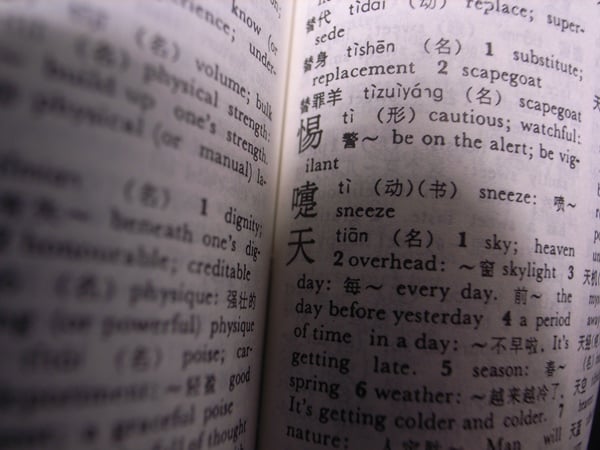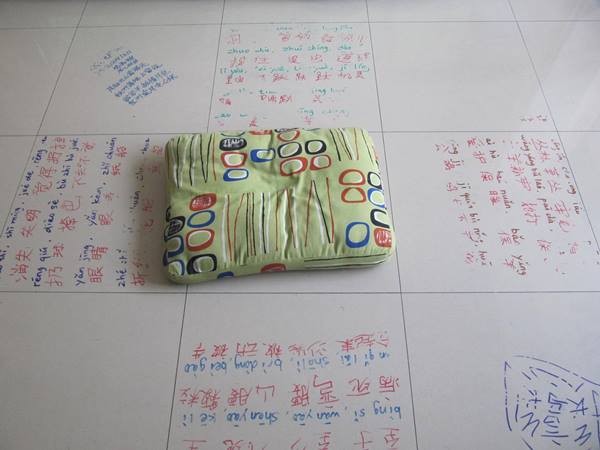5 Things to Know When Buying Your First Chinese-English Dictionary
Choosing the perfect dictionary for your Chinese language studies is bound to be a lot harder than buying a Spanish-English one, or a German-English one, for example. Because, while these languages are all Latin based and therefore share a similar writing structure, Chinese falls into a category of its own because the written language is comprised of characters. Learning and memorizing Chinese characters is enough of a challenge, so having the right dictionary to keep you going strong is a definite must. Not sure where to start? Then check out these 5 things you should know when purchasing your first Chinese-English dictionary:
 Image via PhotoPin
Image via PhotoPin
1. Traditional vs. Simplified
New Chinese language learners are often daunted when they realize that there doesn’t really exist a single written language system for Chinese. Depending on what country you’re in, traditional or simplified characters may be used – and in some case you’ll see both! This is why it’s important for your first dictionary to feature these two systems. By learning to read and recognize both types of writing styles, you’ll have an easier time, whether traveling to China and Taiwan or even heading to Hong Kong. Furthermore, there are always similarities between traditional and simplified characters, so learning both won’t be too tough!
2. Pinyin vs. Radicals
Although memorizing radicals and their pronunciations is essential if you’re hoping to one day be able to read a newspaper in Chinese, they won’t do you much good when it comes to your first Chinese-English dictionary. The beauty of pinyin is that learning the correct pronunciation of a new character is made extremely easy. Which is why it’s recommended that you invest in a dictionary which is character-pinyin and vice versa. This will not only benefit your reading skills, but will help you when it comes to speaking as well!
 Image via PhotoPin
Image via PhotoPin
3. Order vs. Disorder
Of course, just because your dictionary features pinyin, this doesn’t mean you should give up on radicals just yet. What happens if you’re reading a book in Chinese and come across a character you don’t recognize? You’ll have to look it up in your dictionary according to the radical! Shop around for a dictionary that is organized according to radicals in the character section and is in alphabetical order in the pinyin section. This way if you know how to pronounce the character but don’t know its meaning, or you recognize the radical but have no clue as to the pronunciation, you’re always covered!
4. Definition vs. Example
All dictionaries will offer you the definition of a word, but sometimes this isn’t enough. After all, even if you understand the meaning, that doesn’t always indicate you know how to use it in a sentence. This is why a beginner’s dictionary — which offers some simple examples of the word use — is a must. And the added bonus is that you’ll be refreshing your memory with the other characters present in the example sentences!
 Image via PhotoPin
Image via PhotoPin
5. Large vs. Small
You could be that language student who lugs a massive dictionary to class every day, but it really isn’t necessary if you’re still in the beginning stages of learning Chinese. According to research, if you are familiar with the 500 most common characters then you are capable of reading around 75% of modern Chinese. Choose a dictionary that focuses on 500-1,000 of the most used characters as opposed to one which features thousands of them. It’s less overwhelming and will help you to hone your learning focus.
Learning Chinese is not an easy process, but in today’s world this language has a global status which makes being able to speak it a definite must! But before you get serious about buying a dictionary, get serious about your language education so that you have a firm foundation to fall back on. Excellent language classes and free online placement tests are key components which will help you to become a language success. Then, with the right language skills and these 5 tips, you’ll be ready to take on the world of written and spoken Chinese!
